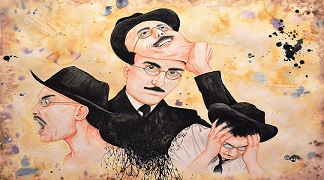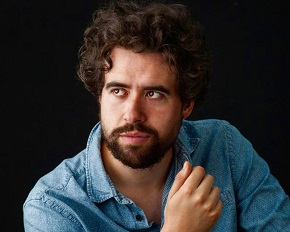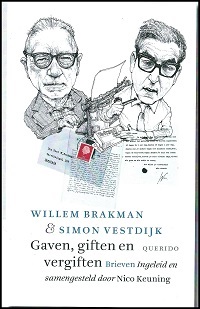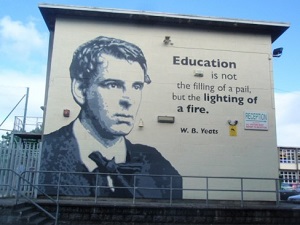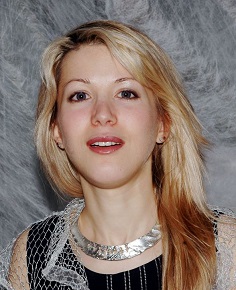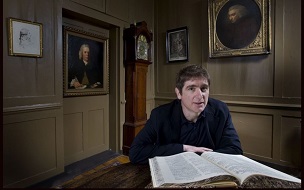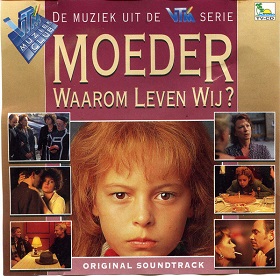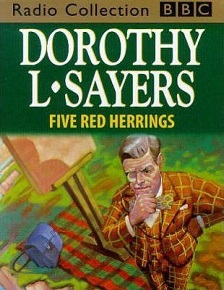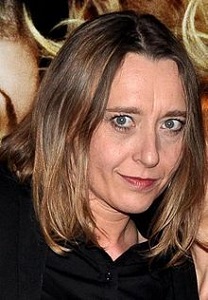De Portugese dichter en schrijver Fernando António Nogueira Pessoa werd geboren in Lissabon op 13 juni 1888. Zie ook alle tags voor Fernando Pessoa op dit blog.
Sonnet VIII
How many masks wear we, and undermasks,
Upon our countenance of soul, and when,
If for self-sport the soul itself unmasks,
Knows it the last mask off and the face plain?
The true mask feels no inside to the mask
But looks out of the mask by co-masked eyes.
Whatever consciousness begins the task
The task’s accepted use to sleepness ties.
Like a child frighted by its mirrored faces,
Our souls, that children are, being thought-losing,
Foist otherness upon their seen grimaces
And get a whole world on their forgot causing;
And, when a thought would unmask our soul’s masking,
Itself goes not unmasked to the unmasking.
Sonnet IX
Oh to be idle loving idleness!
But I am idle all in hate of me;
Ever in action’s dream, in the false stress
Of purposed action never act to be.
Like a fierce beast self-penned in a bait-lair,
My will to act binds with excess my action,
Not-acting coils the thought with raged despair,
And acting rage doth paint despair distraction.
Like someone sinking in a treacherous sand,
Each gesture to deliver sinks the more;
The struggle avails not, and to raise no hand,
Though but more slowly useless, we’ve no power.
Hence live I the dead life each day doth bring,
Repurposed for next day’s repurposing.
Sonnet X
As to a child, I talked my heart asleep
With empty promise of the coming day,
And it slept rather for my words made sleep
Than from a thought of what their sense did say.
For did it care for sense, would it not wake
And question closer to the morrow’s pleasure?
Would it not edge nearer my words, to take
The promise in the meting of its measure?
So, if it slept, ’twas that it cared but for
The present sleepy use of promised joy,
Thanking the fruit but for the forecome flower
Which the less active senses best enjoy.
Thus with deceit do I detain the heart
Of which deceit’s self knows itself a part.
Portret door Antonio Guimaraes, 2009
De Nederlandse schrijver Thomas Heerma van Voss werd geboren in Amsterdam op 13 juni 1990. Zie ook alle tags voor Thomas Heerma van Voss op dit blog.
Uit: De derde persoon (Het weerzien)
“Als
ik thuiskom van mijn werk, anderhalf uur later dan gebruikelijk, heeft
Claire de tafel al gedekt. Ze zet twee koekenpannen neer en serveert
spaghetti bolognese, en pas nadat ik mijn eerste hap heb genomen, zegt
ze: ‘Ik moet je iets vertellen.’
Ik zag de bezorgdheid al in haar ogen toen ik binnenkwam, maar ik dacht: eerst eten, haar onrust verdwijnt vanzelf wel.
‘Natalja komt hierheen,’ zegt Claire. Aan de toonloze, helder
gearticuleerde manier waarop ze spreekt hoor ik dat ze de woorden heeft
ingestudeerd. ‘Ze belde net. Gisterochtend vroeg is ze gaan liften uit
Moskou en iets na tienen wordt ze afgezet bij de Warschauer Straße. Ze
wil het land in, naar een paar oude vriendinnen, maar vanavond komt ze
niet verder dan Berlijn. Ik heb haar gezegd dat ze vannacht hier kan
logeren.’
‘Hier?’ vraag ik. ‘In ons appartement, bedoel je? Ik ken haar helemaal niet.’
‘Je kent haar best.’
‘Welnee, ik heb die vrouw nog nooit gezien. Kan ze geen hotel boeken?’
‘Ze heeft nauwelijks geld, dat weet je toch?’
‘Kennelijk wel genoeg om op vakantie te gaan.’
‘Toe, ik heb je laatst toch gezegd dat ze huwelijksproblemen heeft? Ze
wil Moskou even uit en kent verder niemand hier. Als jij mij zou vragen
of een vriend hier kon blijven slapen, zou ik daar altijd mee
instemmen.’
‘Maar ik heb geen Russische vrienden. En ik ken niemand van boven de veertig die nog lift.’
Natalja. Kom nou, zo’n naam wens je niemand toe. Wat heeft ze hier te
zoeken, in mijn woonplaats, mijn straat, mijn huis? Zij was degene die
Claire, toen die als verlegen meisje uit de provincie begon met
studeren, zomaar aansprak in een café. Een aangeschoten,
zesentwintigjarige vrouw met Russische ouders en een vlotte babbel. Wil
je wat drinken; hoe heet je; wat doe je hier in Berlijn? Ze bouwden een
vriendschap op, intiemer dan veel relaties of familiebanden. Bijna elke
dag waren ze samen. Natalja had geld vanwege een erfenis, en ze
trakteerde Claire op diners, buitenlandse reizen en met alcohol
doordrenkte nachten. Officieel werkte ze voor een Russisch
telecombedrijf, in de praktijk hing ze voornamelijk aangeschoten rond in
cafés. Ze schonk Claire cadeaus: bloemen en horloges, boeken en
kettingen. Tijdens een van hun laatste gemeenschappelijke vakanties
schreef ze Claire zelfs een uitvoerige brief – echt waar, een brief aan
degene die naast haar zat, hoe verzin je het?”

De Nederlandse dichter, schrijver, columnist en muziekdocent Gerwin Friso van der Werf werd geboren in De Meern op 13 juni 1969. Zie ook alle tags voor Gerwin van der Werf op dit blog.
Uit: Luchtvissers
“Ik ga het redden, verdomd, ik ga het redden, ik durf het niet alleen te denken maar nu ook te fluisteren. Nog een uur, hooguit, en dan ben ik alleen. Hoe lang ik hier al sta – verscholen achter het muffe gordijntje – ik heb er geen benul meer van, maar het kan me niet schelen, want het wachten zal niet tevergeefs zijn. Soms doe ik mijn ogen dicht, duw mijn wang tegen het kozijn, dan voel ik de hoofdpijn kloppen tegen mijn linkeroog. Ik probeer al een tijdje onverschilligheid bij mijzelf op te roepen, als een kind dat verstoppertje speelt -‘rat maakt het uit, als ze je vinden, dan ben je erbij, nou en?’ – maar ik slaag er niet meer in. Ik ben ten prooi gevallen aan dit heilig willen. Het moet lukken. Het moet. Twee stalen bedden en een tafeltje, dat is al het meubilair in deze kamer. Als ik het vaalrode gordijn opzij duw kan ik de westelijke zijde van het eiland overzien, tot de vuurtoren, die zo’n twee kilometer verderop staat. Bij het transformatorhuisje zijn werklui bezig, weldra zal er geen stroom meer zijn. Daarachter zie ik het begin van de lange betonnen trap die omlaag naar de pier leidt. Vanochtend heb ik die beklommen, traag, opzichtig om mij heen speurend, in een poging zo veel mogelijk te lijken op de andere vier of vijf toeristen die lucht hadden gekregen van deze laatste trip naar Lundines. Straks, als de veerboot uit zicht is, dan ga ik het eiland verkennen. Mijn eiland.
Eerst heb ik een poos op bed gelegen, uitgeput maar niet in staat te slapen. liet is die eeuwige hoofdpijn die mij in staat stelt te geloven dat alles echt gebeurd is. ‘Je bent er,’ zegt de hoofdpijn, le bent er nog steeds.’ Maar niet geklaagd, de pijn is draaglijk, zij wordt gewiegd in de armen van Ibuprofen, mijn lief, die zo goed voor mij zorgt. De hele tijd hoorde ik voetstappen langs het huis gaan, het piepen van karretjes en steekwagens. De geluiden maakten me zo nerveus dat het me beter leek gewoon toe te kijken, verscholen achter het gordijn, als een uitgerangeerde acteur die stiekem in de coulissen wacht tot het toneel leeg is en het publiek naar huis. Iets wat ik werkelijk niet verwacht had: ik heb een bed met een schoon laken. Wat is dat voor gerommel achter het huis? Gebonk op de muren, het hele huis trilt mee en versterkt het geluid, zodat ik niet kan bepalen waar het vandaan komt. Een klap, alsof er een deur dichtgesmeten wordt. Een scheut hoofdpijn jaagt door mijn kop, mijn ogen lopen vol met traanvocht, niet braken, diep ademen. De pijn zakt terug. Net als ik onder het bed wil kruipen is alles alweer voorbij. Niets aan de hand, niemand is binnengekomen. Rustig wacht ik tot de misselijkheid is weggezakt. Acht pakken Sultana’s heb ik in mijn rugzak zitten, één daarvan maak ik open. Twee koeltjes, tegen het lege, misselijke gevoel. De kruimels klop ik van het bed, met de neus van mijn schoen duw ik ze tussen de kieren in de plankenvloer.”
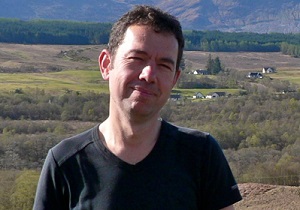
De Nederlandse schrijver Willem Brakman werd geboren op 13 juni 1922 in Den Haag. Zie ook alle tags voor Willem Brakman op dit blog.
Uit: Vestdijk en pantoufles
“Eenmaal ben ik op zijn werkkamer geweest waar ik nog geen briefkaart had kunnen schrijven. Het was er donker, op zijn tafel lag alles netjes geordend, een klein raampje met breed kozijn was haast volgestapeld met stenen die hij had gevonden in zijn leven. In een kast verwonderlijk weinig boeken, veel Simenons. De trap, de leuningen en de deur naar deze kamer waren in een afschuwelijk geel geschilderd. Hij was zonder meer een slecht causeur, luisterde liever en als het kon naar roddel. Eenmaal heb ik hem gevraagd of hij beschikkend over afluisterapparatuur die verbinding gaf met alle slaapkamers van Doorn deze ook zou gebruiken, waarop hij antwoordde: “Wat wil je, ik ben schrijver.” Nee, ik heb dat geel van de overloop naar zijn kamer nooit meer ergens aangetroffen, het was de idee geel in al haar verschrikkingen. Hij was een slecht causeur; wat hem ook werd aangedragen als mogelijke structuur of thema van zijn werk, zijn antwoord was steevast: “Neu zeg”, en dat terecht: vraag geen schrijver naar zijn bedoelingen, dat is een zonde tegen de heilige geest der literatuur, tenminste toen.
Toen ik tijdens mijn diensttijd in het militair hospitaal was opgenomen en om verschillende redenen op rantsoen moest wat het lezen betreft, kwam zijn boek De verminkte Apollo uit. Ik las in de ochtend twee bladzijden, ’s middags dezelfde twee en’s avonds idem. Dat was pas lezen en hij was me in die tijd een ware troost.
Later, als arts, heb ik stad en land voor hem afgelopen en aan alle psychiaters gevraagd naar de laatste ontwikkelingen op het gebied van de endogene depressie. Zeer vele artsenmonsters zond ik zijn kant uit en dat heeft hem dankbaar gestemd. Een keer vroeg ik hem of een middel had geholpen. “Nee,” zei hij, “maar ik heb er nu minder last van.” Nog een echt Vestdijk-antwoord.
Op Schiermonnikoog denk ik altijd aan Roland Holst en Vestdijk. Deze twee schimmen vergezellen mij daar overal. De laatste omdat ik er een huis ken dat precies het huis is van zijn geboorte. Soms, heel alleen ergens in de duinen en al fietsend, want dan kan er veel, vraag ik aan die hemel boven mij: “Simon, ben je daar?” en zijn antwoord is dan altijd: “Neu zeg.”
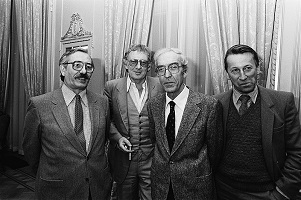
V.l.n.r de schrijvers Henk Barnard, Hugo Claus, Willem Brakman en de dichter Roland Jooris
De Franse schrijfster en filmmaakster Virginie Despentes werd geboren in Nancy, Meurthe-et-Moselle, op 13 juni 1969. Zie ook alle tags voor Virginie Despentes op dit blog.
Uit: Bye Bye Blondie (Vertaald door Sian Reynolds)
“He’d announced, with that confidence possessed only by kids under twenty, that “it’s the most beautiful name in the world.” He was wearing a white Perfecto leather jacket. A dark-haired boy with broad shoulders, fleshy lips, and a piercing gaze. Possibly it wasn’t piercing at all, perhaps he was just nearsighted, but she had thought this was someone who could fathom the depths of your soul and caress its vice. Whatever, he’d blown her mind, and starting the next day she had told every new person she met: “Hi, I’m Gloria.” And the name had stuck. Because twenty years later, that’s still what peo- ple are calling her.
Jérémy sweeps by grandly, carries off her glass and brings it back full. He’s humming, walking with shoulders a little bent, his low-slung, hyperbaggy jeans exposing a band of belly: smooth golden skin, young man’s skin. With one hand, Gloria hoicks up his trousers, scolding: “Hey kid, get your ass back inside your pants.”
Jérémy wanders off, delighted that someone in this place has protested yet again about his trousers.
Two men have just arrived, and now they’re hardwired to the counter. Difficult to put an age on the older one, he’s so destroyed by drink. A caricature of the wine-bibbing Frenchman: strawberry nose, puffy face, sepulchral voice, rotten yellow teeth. With him is a hulking, ruddy-faced youngster, head sunk into his shoulders, probably his son.
The old man is yelling, he’s already plastered, and now he’s furious: “I don’t believe it! You got a brain or what? God should’ve given you another asshole, you’re so full of shit.”
Gloria exchanges a quick glance with Jérémy. They both roll their eyes and turn away to hide a smile.
Every day, these two come into the Royal, just to shout at each other all afternoon. Around aperitif time, off they go to the betting shop, the old one still yelling at the young one. Gloria predicts, as she watches them stagger away every night at about seven, that one day they won’t be back: the young one will have chucked the old one out the window.
The young one blows his nose, making a hell of a noise. Gray-and-red tracksuit, picked up on sale, no doubt, and he has these enormous feet. Gloria can’t get used to how big young boys’ feet are, she wonders if there’s some plan up there in the cosmos for the human race. Should it be planning to go and live underwater, growing long flippers? The kid’s jaw drops when he sees her, he looks truly impressed.”

De Ierse dichter, toneelschrijver en mysticus William Butler Yeats werd geboren in Sandymount bij Dublin op 13 juni 1865. Zie ook alle tags voor William Butler Yeats op dit blog.
Three Songs To The Same Tune
I
GRANDFATHER sang it under the gallows:
‘ Hear, gentlemen, ladies, and all mankind:
Money is good and a girl might be better.
But good strong blows are delights to the mind.’
There, standing on the catt,
He sang it from his heart.
Those fanatics all that we do would undo;
Down the fanatic, down the clown;
Down, down, hammer them down,
Down to the tune of O’Donnell Abu.
‘A girl I had, but she followed another,
Money I had, and it went in the night,
Strong drink I had, and it brought me to sorrow,
But a good strong cause and blows are delight.’
All there caught up the tune:
‘On, on, my darling man’.
Those fanatics all that we do would undo;
Down the fanatic, down the clown;
Down, down, hammer them down,
Down to the tune of O’Donnell Abu.
‘Money is good and a girl might be better,
No matter what happens and who takes the fall,
But a good strong cause’ — the rope gave a jerk there,
No more sang he, for his throat was too small;
But he kicked before he died,
He did it out of pride.
Those fanatics all that we do would undo;
Down the fanatic, down the clown;
Down, down, hammer them down,
Down to the tune of O’Donnell Abu.
Veronica’s Napkin
THE Heavenly Circuit; Berenice’s Hair;
Tent-pole of Eden; the tent’s drapery;
Symbolical glory of thc earth and air!
The Father and His angelic hierarchy
That made the magnitude and glory there
Stood in the circuit of a needle’s eye.
Some found a different pole, and where it stood
A pattern on a napkin dipped in blood.
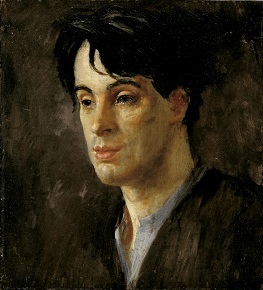
Portret door Augustus John, 1907
De Franse journaliste en schrijfster Tristane Banon werd geboren op 13 juni 1979 in Neuilly-sur-Seine. Zie ook alle tags voor Tristane Banon op dit blog.
Uit:Daddy frénésie
« Vingt-cinq
ans qu’elle a cessé de le chercher à la maison. Vingt ans à croire que
c’était peut-être sa faute, dix ans à le poursuivre, le transposer, le
déceler chez tous les hommes de sa vie, dix ans à espérer qu’il soit
chercheur d’or et pas juste lâche… Vingt-sept ans sans père, sur
vingt-sept, ça suggère beaucoup de désordre mental.
Et pourtant, cinq ans peut-être, ou bien sept, pas plus, qu’elle devine que sa mort lui serait égal.
Cinq ans qu’elle entend : «Tu dis ça, mais au fond…» Mais au fond,
même très au fond, au sous-sol d’elle-même, elle en est persuadée. Qu’en
savent-ils, du fond, les gens ? Sont-ils allés fouiller derrière ses
entrailles, dans ses tripes, pour parler en son nom ? Qu’en coassent-ils
de ce qu’elle a au fond, eux qui ont des pères a appeler quand ça ne va
pas ? Elle balance «ça», comme ils disent, et elle le pense. Elle
choque parfois, et elle assume Elle a toujours su que parler de la mort
était quelque chose de tabou, elle découvre que s’y montrer indifférente
est une preuve d’inhumanité difficile a défendre. Pire, ne pas souffrir
par avance du décès, pourtant certain, à court ou moyen terme, de son
géniteur serait proche du parricide mental. Pourtant, réalisatrice de ce
finale programmé pour chacun d’entre nous elle voit bien la scène.
Alors ne la forcez pas le jour venu, a participer aux au revoir. Elle
sait sa réaction. Elle entre dans l’église parce qu’on l’y a obligée,
elle s’avance jusqu’au corps parce qu’on la pousse, elle regarde son
visage paisible et elle se dit : «Pour un lâche il a le sommeil
profond.» Elle sort et on ne veut plus la voir. Ça ne la dérange pas, on
ne l’a jamais vraiment vue jusqu’alors, et elle n’a véritablement
manqué à personne. Elle ne sera pas là pour rappeler le souvenir de
celui qu’elle ne connaît pas. »
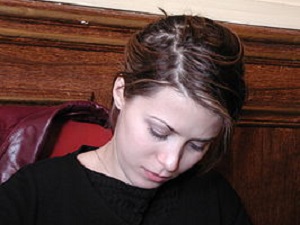
De Britse schrijver en presentator Marcel Theroux werd geboren op 13 juni 1968 in Kampala, Oeganda. Zie ook alle tags voor Marcel Theroux op dit blog.
Uit:Strange Bodies
“Nicky stepped out of the shadows. He looked much worse than when I’d last seen him: unshaven, tired, and badly dressed, but also more like his old self; he’d lost weight and his face had some of its shape back.
He told me he needed a place to stay. I explained about the book group and warned him that Babette was waking a lot in the night, but he didn’t look like he had many other options. He sagged into the passenger seat like an old man.
From Ludlow to Barbrook is a twenty-minute drive, assuming you don’t get stuck behind a tractor or a tourist. Nicky ignored my questions and didn’t seem in any mood to talk. I found myself filling the silence by chattering on about my day, but by the time we got to Cleehill I couldn’t pretend anymore. I pulled over just beyond the pub. The locals call it the Kremlin because they claim it’s the highest point between there and the Urals, and in the old days the jukebox used to pick up Radio Moscow. The rain had stopped. The moon was out and beyond the hills we could make out the vague orange glow of Birmingham. I turned to Nicky and asked him what was going on.
“It’s a long story,” he said. “I was in the Maudsley for a while.”
“Studying?” For some reason, I assumed it was a college.
“Sectioned,” he said. And then by way of explanation: “It’s a loony bin outside Croydon.”
Hailstones pounded on the roof of the car. We’d have to drive home the long way round, because the ford would be too dangerous to cross.
“Does Leonora know you’re alive?”
“The Nicky she knew is dead.” He said it matter-of-factly, with no real venom, but the hopelessness of it shocked me. And in the yellow rays of the Kremlin’s outside light, his teeth looked crooked and broken. Suddenly, it struck me that he was, after all, really a stranger, and I was seized by a panicky feeling.”
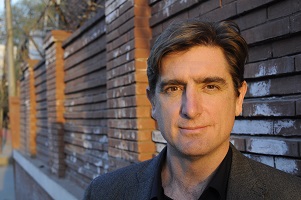
De Nederlandse dichter en schrijver Steven Membrecht (pseudoniem van Jochem van Beek) werd geboren in Amersfoort op 13 juni 1937. Zie ook alle tags voor Steven Membrecht op dit blog.
Uit: De ruime gevangenis (een brief)
“De reden dat ik je schrijf, Abel, is dat ik gisteravond een opzienbarende ontdekking heb gedaan, die zo ingrijpend voor ons beiden is, dat ik je haar niet wilde onthouden.
Het hele proces dat tegen jou gevoerd is en waartegen ik niet het minste kon inbrengen, krijgt er een heel andere betekenis door. Wat dat betreft kan ik kort zijn: het is onwaar, vol afschuwelijke misverstanden. Maar ook is het van het allergrootste belang voor ons. Gisteravond drong dat onmiddellijk na wat ik gezien had tot mij door. Hoewel ik je nog in deze brief zal verklaren wat ik heb ontdekt moeten mij eerst enkele opwellende gevoelens van het hart.
Ik kreeg geen kans je nog te spreken nadat het levenslang over je was uitgesproken. Ik denk dat die malle rechters dat niet toestonden omdat ze maar al te goed gemerkt hebben dat wij tweelingen zijn, zelfs eeneiïge tweelingen en in hun domme kortzichtigheid verwisseling van veroordeelde wilden voorkomen.
Hoewel het proces door mij even afschrikwekkend beleefd werd als door jou, gaf onze gelijkenis er in zekere zin een vrolijke noot aan. Het zal jou namelijk ook vast wel opgevallen zijn hoe de rechters, de officier van justitie en zelfs jouw advokaat vaak in de grootste verwarring hun blikken lieten afdwalen naar de publieke tribune, waar ik zat. Het was dan alsof zij dezelfde overtuiging toegedaan waren als ik: die beklaagde, die daar zojuist nog zat, kunnen wij nauwelijks naar eer en geweten ondervragen of beschuldigen, want hij is niet volledig. Er ontbreekt veel van hem waardoor wij tijdens het proces slagen in de lucht doen; een hagedis zonder staart trachten te vangen. (Dat ik juist dit beeld gebruik zal je spoedig duidelijk zijn).
Hoe prijs ik mijzelf sinds gisteravond dat die overtuiging volkomen gerechtvaardigd was en geenszins alleen op grond van onze fabuleuse gelijkenis. Toch veracht ik mezelf ook dat ik hun de juistheid van hun weifelende gedachte niet al tijdens het proces heb kunnen toeschreeuwen, waardoor grote verwarring zou zijn ontstaan en jij wellicht heel anders beoordeeld zou zijn. Het was dan zelfs niet onmogelijk geweest dat ze je hadden vrijgesproken. Was dat een feit geworden, dan moet ik je echter teleurstellen door te zeggen dat ik toch nooit meer met jou onder één dak had kunnen leven.”
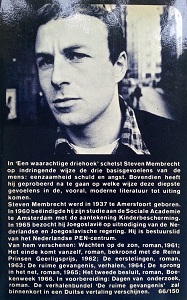
Cover achterkant
Zie voor nog meer schrijvers van de 13e juni ook mijn blog van 13 juni 2018 en ook mijn blog van 13 juni 2017 en mijn blog van 13 juni 2015 deel 1 en eveneens deel 2.

